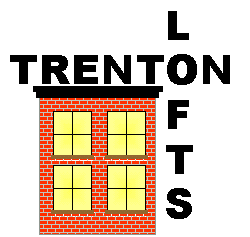 |
Investing in Trenton

by Dan Dodson
There are two types of investor in the Trenton real estate market, developers and speculators. I'm a big fan of the developer and am reserving a special place in real estate hell for the speculator. A developer buys a piece of property and invests real money, let's say more than 20% of the value, into improving it. Through their efforts they raise the value of properties surrounding their own thereby creating a multiplying effect.
Richard Libby is putting far more than 20% into the Broad St. Bank building, David Henderson and his partners did the same with the Labor Lyceum as is Dan Brenna with the Ice House (BTW - work is well underway). Avner Krohn is doing the same with the Backes Hill and Light Furniture buildings. Roland Pott, Bill Carlucci and Rich Tola (Adams One) are doing the same. These guys are developers and in my book are Trenton's heroes. Their projects will do more to stabalize our community than city government can ever do.
On the flip side of the equation are the speculators. They buy an empty building and sit on it hoping to flip it. In many cases the building deteriorates while it sits, dragging down neighborhood values. Jon Edelkopf falls into this category as does Paul Shore who, for years, has sat on the beautiful old buildings on Greenwood Ave across from the train station. However in terms of sheer numbers, the city actually owns more abandoned property than any other land owner.
I run into another kind of speculator all the time at cocktail parties. The conversation usually goes like this:
"I hear you know something about Trenton real estate, is it on the upswing? I'm thinking of buying some properties." By this they mean they're going to buy an occupied rental property and milk it for cash flow. If property value goes up through the sweat of others, they might sell for a capital gain. It's all I can do to be polite.
My philosophy is that if you're not part of the solution to improving quality of life, you're part of the problem. Every investor in Trenton should be prepared to either dramatically improve their property or do something to make the city a better place to live. Trenton needs more absentee landlords like it needs more gangs.
For the developer, I've started this web site to help buyers find them. I know that Trenton Lofts has played a role in renting out a lovely downtown loft and in a few other sales. It's a beautiful thing when buyers and sellers get together and I'm proud to be of help.
For the speculator, I'm supporting the city's use of the NJ Abandoned Buildings law. This law allows a city to basically force a building owner to either sell the property or give it up. An interested party, like a developer or non-profit, can purchase the property through this process. I'm encouraged that Trenton and specifically Dennis Gonzalez is starting to work on this process.
The NJ Abandoned Buildings law is a form of eminent domain which in general is the most abhorent abuse of governemental power around today. Leewood Development and the city of Trenton were guilty of proposing the use of eminent domain in South Trenton. In that case they were going after occupied buildings, in some cases owned free and clear by the resident. Can you imagine the horror of being forced to sell your house at a price the buyer dictates? I cried foul in that case and fortunately, through the hard work of neighborhood activists, the plan was killed. However, abandoned properties are different. The city has an interest in maintaining the overall appearance and value of its real estate stock. Owners of abandoned buildings that speculate and refuse to improve or maintain the property are in conflict with those interests. It's the same as if you let your lawn go to weed. The city has an obligation to its citizens to protect them from abandoned buildings.
Making the distiction between developer and speculator is important for our city's policy makers and for potential investors. The easiest way to revitalize Trenton is to make life as easy as possible for the developer and as hard as possible for the speculator. The city needs to take helpful and proactive stance towards developers large and small. Speculators like Paul Shore, who acquired his properties from the city with the agreement that he would renovate them within a certain amount of time, need to be dealt with harshly.
So, for the potential developers on this list, let me offer some advice. (Be warned - you get what you pay for).
Dan Dodson is a management consultant and Leadership Trenton Fellow.
Copyright 2005, Dan Dodson